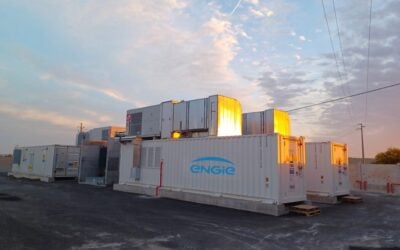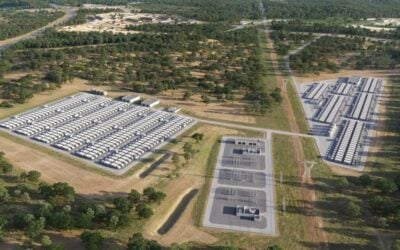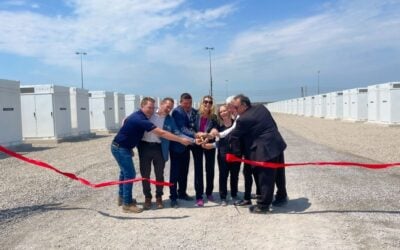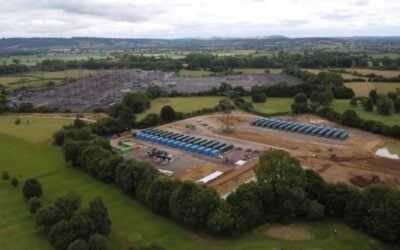
The award of contracts to 1GW of battery storage was the “biggest news” to emerge from the latest round of Capacity Market auctions held in the UK, according to energy consultancy EnAppSys.
Energy-Storage.news’ sister site Current± reported the full results earlier this week of the UK’s T-4 Capacity Market auction, awarding contracts beginning in the 2025/2026 window. It cleared at a record high price of £30.59 (US$41.03)/kW/year, due largely to the decommissioning of old assets and higher capacity needs.
Enjoy 12 months of exclusive analysis
- Regular insight and analysis of the industry’s biggest developments
- In-depth interviews with the industry’s leading figures
- Annual digital subscription to the PV Tech Power journal
- Discounts on Solar Media’s portfolio of events, in-person and virtual
While gas plants were the biggest winners, awarded 27,632MW of contracts from the 42,364MW total, interconnectors got just under 7GW and pumped hydro storage 2.5GW, it was the 1,093MW of battery storage contracts which should be paid closest attention, EnAppSys director Paul Verrill said.
“Battery project winners are the biggest news in this auction, with many new-build battery projects having chosen the year with the highest ever clearing price for a T-4 auction to come online,” Verrill said.
“This is a major boost in particular for those units that were able to secure long-term contracts.”
Around 8.3GW of battery storage registered to participate, although due to de-rating rules, this was equivalent to more like 2.3GW. EnAppSys’ director said de-rating meant battery assets will only see about 30% of the CM payment price.
Awarded contract lengths range from 1 to 15 years. Another industry expert, Chris Matson, partner at energy system analysis and modelling group LCP said that the planned decommissioning of five nuclear plants and the retirement of coal off the system entirely by 2025 left a gap in supply which new-build resources could fill at higher capacity prices.
‘Watershed moment’
Matson called the results a “watershed moment” as the clearing price smashed a previous record of £22.50/kw/yr. With battery storage making up the majority of new capacity awarded 15-year contracts (3.3GW in total, or 1.0GW de-rated for duration) the auction is representative of the energy grid’s transition, he said.
Aurora Energy Research, another industry expert group, said the contracted amount for battery storage was up by around 800MW from last year’s T-4. More than 60% of the new awards to battery storage were for two-hour duration resources.
Among the developers celebrating 15-year contract wins were the UK arm of Singapore-headquartered Sembcorp, and Intergen, a domestic player and relative new entrant to the space better known to date for legacy thermal power plant technologies and wind power.
Sembcorp won for 150MW of two-hour duration battery storage (300MWh), expected to be operational by 2023 and part of a planned 360MW battery energy storage system (BESS) project, which will be alongside another 120MWh in the company’s total UK BESS portfolio.
Meanwhile, InterGen’s contract was for the UK’s largest planned battery storage project so far, the 360MW/640MWh Gateway project near London in southern England. InterGen said the CM contract “will cement the development of the project,” which will cost around £200 million and is set to begin construction next year.
Energy storage technology company Fluence has been revealed as BESS technology provider for the project, which InterGen said could be later expanded to 450MW/900MWh. The developer also has a number of other sites in development, it said, including a potential 550MW/1,100MWh plant in Lincolnshire, northern England.
“We are delighted with the result of the Capacity Market auction, which represents a big step forward for our Gateway storage project and for the country’s net zero target,” Jim Lighfoot, InterGen CEO said.
“Our mission is to deliver the flexible electricity solutions that everyone can rely on in a low carbon world and battery storage helps us do this.”
The T-4 auction’s awarded capacity came in at just under the 43.6GW of targeted capacity. The contract awards came in at a total cost of £1.3 billion.
Result follows award of 385MW in T-1 year ahead auction
Earlier this month, the UK’s T-1 CM auction — a year-ahead auction which guarantees capacity for delivery during stress events from 2022-2023 — saw a total 4,996.224MW of de-rated capacity awarded across 226 Capacity Market Units (CMUs).
They cleared at the maximum price of £75/kW/yr, the highest price ever seen in the UK’s Capacity Market and included 385MW of battery storage and 85MW from pumped hydro.
In a webinar hosted by Current± this week on the impact of the ongoing energy crisis on Capacity Market dynamics, EnAppSys’ Paul Verill said that the crisis’ supply crunch is contributing to record prices, but in turn the CM’s design could be argued to be exacerbating tight capacity margins.
1.1GW of battery storage wins Italy contracts
In Italy this week, grid operator Terna awarded 34.1GW of capacity market contracts to existing assets, 3.8GW to new assets and 3.6GW to so-called ‘virtual assets’. Awards to new-build energy storage facilities made up 1.1GW of that new-build capacity, with 300MW already authorised plants which cleared at a price of €70 (US$78.47)/MW/yr and 800MW of unauthorised plants cleared at lower tariffs. 500MW of that energy storage will be on the southern island of Sardinia.
Additional reporting for Energy-Storage.news by Andy Colthorpe.
The UK portions of this story originally appeared as separate items covering the UK Capacity Market on Current±.






